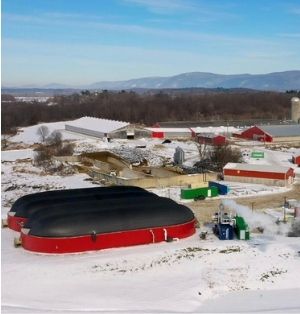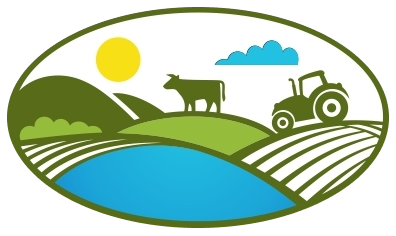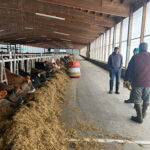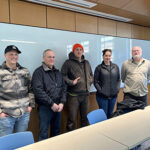
The Champlain Valley Farmer Coalition is proud to share that one of our members, Goodrich Farm of Salisbury, has won a 2021 Outstanding Dairy Farm Sustainability Award. They are being recognized for their anaerobic digester that converts manure and food/beverage waste into natural gas for heating and cooking. Congratulations to the Goodrich Family for this incredible achievement! For more details of the award, read the press release from their partner, Vanguard Renewables, below.
Goodrich Farm of Salisbury, Vermont Wins 2021 Dairy Sustainability Award
Unique Farm Powered Anaerobic Digester partnership with Vanguard Renewables, Middlebury College, and Vermont Gas Systems recycles farm and food waste into carbon negative renewable natural gas.
Boston, MA & Middlebury VT, June 14, 2021 – Today the Innovation Center for U.S. Dairy announced that Goodrich Farm of Salisbury, Vermont is the winner of a 2021 Outstanding Dairy Farm Sustainability Award. The U.S. Dairy Sustainability Awards honor dairy farms, businesses, and partnerships whose practices improve the well-being of people, animals, and the planet. Among its many sustainability initiatives, the Goodrich Farm hosts an anaerobic digester in partnership with Vanguard Renewables, Middlebury College, and Vermont Gas Systems that produces 180,000 Mcf of renewable natural gas and features the first phosphorus removal system in Vermont to protect the Lake Champlain watershed.
“The Goodrich Family is invested in the future. They have created a path of sustainability focused on innovation,” said Anson Tebbetts, Secretary for Vermont’s Agency of Agriculture, Food & Markets. “All through the process, Chase and his family knew it would create a positive path for their multi-generational family farm. But the project is also about their neighbors and the community including a major college institution.”
Goodrich Farm, managed by siblings Chase and Danielle Goodrich, is a multi-generational dairy farm in Addison County milking 900 cows while caring for more than 2,000 acres of land. The farm is a member of the Agri-Mark/Cabot Cooperative. In 2020, the unique partnership of Goodrich Farm, Vanguard Renewables, Middlebury College, and Vermont Gas Systems launched a 1.32-million-gallon Farm Powered® anaerobic digester project to produce 180,000 Mcf of renewable natural gas annually from manure and food and beverage waste. One of the largest anaerobic digesters in the U.S., the project was over a decade in the making.
“In 2009, when Danielle and I entered the dairy business after attending college, we saw two major challenges to our viability – the dairy business was getting more volatile and the environmental impact of dairy farms was under greater scrutiny,” said Chase Goodrich. “Hosting the anaerobic digester diversifies our income, improves our carbon footprint while protecting water quality, and makes us better neighbors, farmers, and animal owners.”
At the Farm Powered anaerobic digester methane-emitting cow manure and food waste are recycled into carbon negative renewable natural gas (RNG). The RNG travels by pipeline to Middlebury College’s nearby power plant, bringing the College closer to reaching its 10-year goal to power the campus with 100 percent clean energy. The anaerobic digester provides the farm with a diversified income stream in addition to high-quality, low carbon liquid fertilizer, animal bedding, and a reduction in the farm’s carbon footprint.
“We are thrilled for this recognition for the Goodrich Family”, said John Hanselman, Founder and Chief Development Officer of Vanguard Renewables. “Even better, Chase and Danielle’s sustainability journey is highly replicable. All dairy farms can incorporate regenerative agricultural practices such as no till farming and cover crops and pursue hosting an anaerobic digester project to diversify revenue and sustain the farm for future generations.”
This year the U. S. Dairy Innovation Center awards recognized seven winners across five categories; and Goodrich Farm is one of three 2021 Outstanding Dairy Farm Sustainability winners across the U.S. and the only winner in New England. The New England region has a strong agrarian tradition but lost 19 acres of farmland per day or 7,000 acres/year between 2001 and 2016 due to severe development pressure (according to the latest data available from American Farmland Trust).




